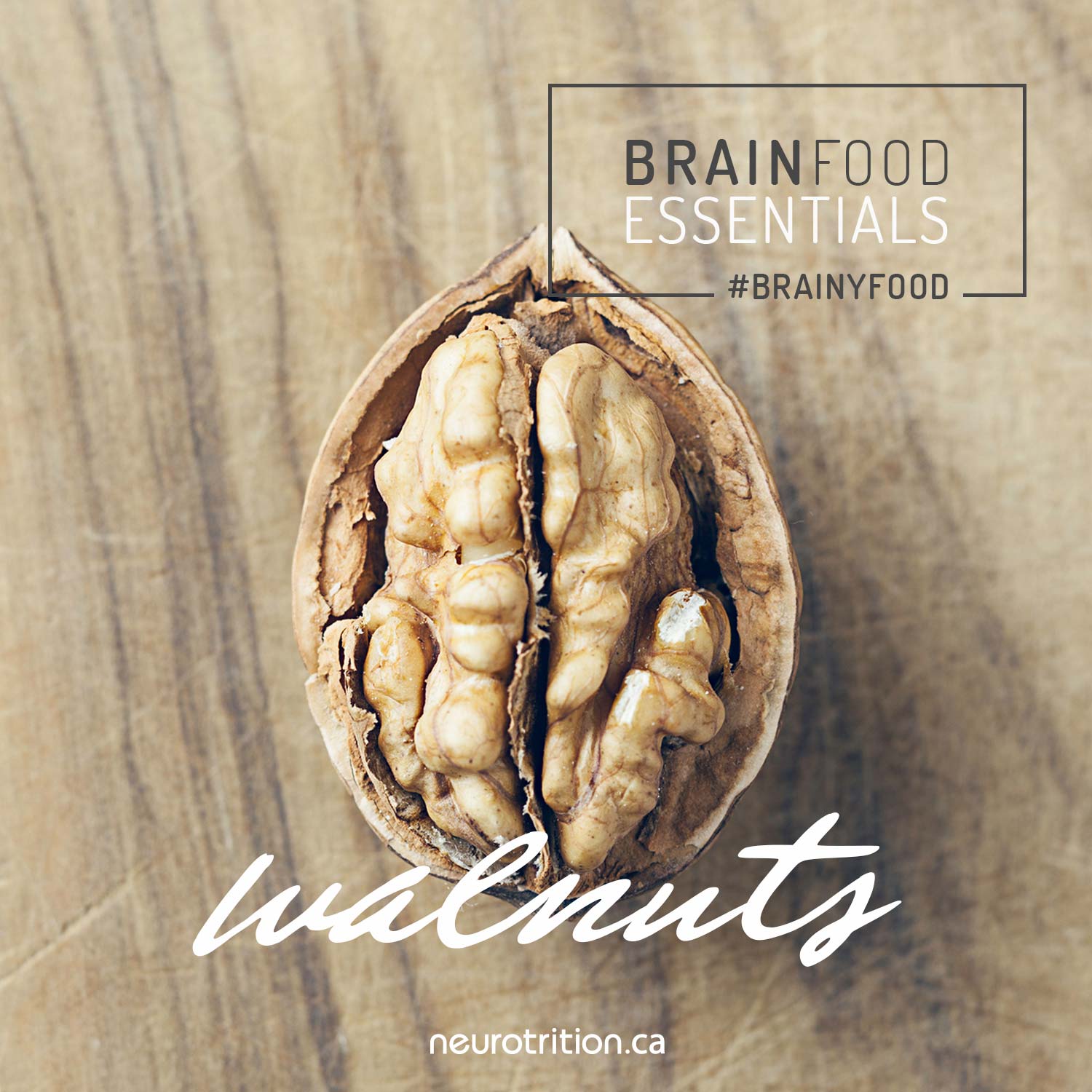Brain Food Essentials: WALNUTS

Just because walnuts look similar to our brains, doesn't mean they're brain food... or does it?
Walnuts are a popular and delicious tree nut, and they are one of the favourite brain foods of our NeuroTeam.
Would you believe me if I said studies have shown that a higher intake of nuts was associated with better cognitive function in old age?
It's true!
And in case you were wondering, you may be pleasantly surprised to know that eating nuts is NOT associated with gaining weight! Bonus!
And, of course, walnuts contain a lot of nutrition! This includes the vitamin folate, as well as the minerals calcium, potassium, phosphorus, and magnesium (all these minerals are electrolytes and crucial for your nervous system and brain). Walnuts also contain antioxidant and anti-inflammatory phytochemicals (phyto=plant), melatonin (your sleep neurotransmitter), as well as protein, carbohydrates, fibre (for your friendly gut bugs), and healthy fat.
WHAT ABOUT THE FAT IN WALNUTS?
At NeuroTrition, we want you to feed your brain with healthy fats (your brain NEEDS healthy fat!). And walnuts certainly qualify! They contain both essential fatty acids: alpha-linolenic acid (omega-3) and linoleic acid (omega-6). BOTH of these healthy fats have been shown to boost brain health and function. In excess omega-6 fats from low quality sources (like refined oils) promote inflammation, but you DO need some omega-6, in a 2:1 ratio to omega-3, ideally, from healthy sources like raw nuts and seeds. When it comes to the essential omega-3, your body can then go on to convert it into the brain powerhouses EPA and DHA, which have many brainy benefits, including maintaining “plasticity,” and helping to stabilize nerve cell membranes. To top it off, the omega-3 to omega-6 ratio contained in walnuts is the highest among all of the tree nuts.
Some neurological issues seem to be related to a change in the fatty acids of the nerve cell membranes themselves.
One reason why healthy fats are so important in feeding your brain is that some neurological issues seem to be related to a change in the fatty acids of the nerve cell membranes themselves. In other words, you don't want a skinny brain!
WALNUT ANTIOXIDANTS FOR YOUR BRAIN
You brain is an amazing powerhouse for your body. It controls so many functions and to do so, it also requires so many resources. At rest, up to 20% of your metabolism is due to brain activity alone. Now imagine when you’re having a deep thought, a conversation, or doing anything physical!
Your brain's high metabolic rate creates a lot of reactive (and potentially damaging) free radicals that your body naturally counteracts with antioxidant compounds, to achieve a nice healthy balance. However, as we age, that balance can tip more toward oxidation (i.e. free radical damage) and inflammation. This is where some of the cell damage stems from. And this is why consuming antioxidants from whole food sources, like walnuts, is so important!
NEURODEGENERATIVE DISEASES
Many of the brain diseases linked with older age (e.g. Alzheimer's, Parkinson's, dementia, etc.) seem to be associated with long-term exposure to oxidation and inflammation. These two brain busters can eventually lead to brain cell damage and can negatively affect learning, memory, decision-making, and motor function.
You probably wouldn't be surprised to find out that many other diseases are also linked to oxidation and inflammation, such as heart disease, cancer, and diabetes. It now makes sense why we see such a correlation (not causation) between these diseases and brain-related diseases.
Studies have found that middle-aged and older adults who eat more nuts seem to have higher cognitive function, and slower decline in cognitive function over the years!
Studies have found that middle-aged and older adults who eat more nuts seem to have higher cognitive function, and slower decline in cognitive function over the years!
Walnuts have also been shown to be heart-healthy, and heart health is associated with brain health. When you reduce your risk factors for heart disease, you also reduce your risk factors for cerebrovascular diseases such as stroke and cognitive impairment.
So, nutritious foods like raw walnuts, that are full of brain-loving fats and also have antioxidant and anti-inflammatory properties, have a big role to play in reducing the risk and progression of many chronic and debilitating diseases of both the brain and body.
5 WAYS TO GET MORE WALNUTS INTO YOUR LIFE
- Shelled walnuts are the ultimate on-the-go snack. Just throw a handful into your favourite eco-friendly container and take them with you anywhere (except perhaps some grade schools where there may be some children with serious nut allergies).
- Do you eat chocolate (high-quality, dark, organic, whenever possible)? Why not pair it with some walnuts? Always opt for raw walnuts, whenever possible.
- How about sprinkling some walnuts on your salad? Or on your soup? And if you can remember or are so inclined to do so, you can soak your walnuts (or any nuts) overnight in water, which helps make them more digestible.
- Ever heard of nut milk? How about walnut milk? You can essentially make any dairy-free vegan nut milk with your nut of choice. For walnuts, take ½ cup of toasted or raw (your preference) and blend in a high-speed blender with 2 cups of water. Optional add ins: 1/4 teaspoon pure vanilla extract and/or 2 teaspoons maple syrup.
- Like dates (we love Mejool)? Ever stuffed them with a walnut? Simply slice open a date and place one half of a walnut into it where the pit originally was. This is delicious with figs, too, just remove some of the seeds and squeeze that walnut in!
This brain look-alike is not an imposter, but a bona fide brain food! So that’s why we recommend 1/4 cup of raw walnuts (or other raw nuts and seeds) daily, or 1 cup of walnut (or other nut) milk every day. Enjoy!
- References
-
- Baer, D.J., Gebauer, S.K. & Novotny, J.A. (2016). Walnuts Consumed by Healthy Adults Provide Less Available Energy than Predicted by the Atwater Factors. J Nutr, 146(1):9-13.
- Hayes, D., Angove, M.J., Tucci, J. & Dennis, C. (2016). Walnuts (Juglans regia) Chemical Composition and Research in Human Health. Crit Rev Food Sci Nutr. 56(8):1231-41.
- Nooyens, A.C.J., Bueno-de-Mesquita, H.B., van Boxtel, M.P.J., van Gelder, B.M., Verhagen, H. & Verschuren, W.M.M. Fruit and vegetable intake and cognitive decline in middle-aged men and women: the Doetinchem Cohort Study. Br J Nutr. 2011;106:752–61.
- Poulose, S.M., Miller, M.G. & Shukitt-Hale, B. (2014). Role of walnuts in maintaining brain health with age. J Nutr, 144(4 Suppl):561S-566S.
- Roberts, R.O., Knopman, D.S., Geda, Y.E., Cha, R.H., Roger, V.L. & Petersen, R.C. (2010). Coronary heart disease is associated with non-amnestic mild cognitive impairment. Neurobiol Aging, 31:1894–902.
- USDA Food-Nutrient Database, Walnuts










